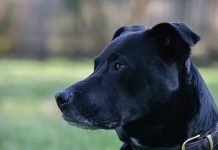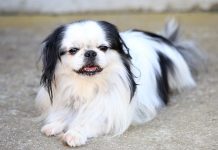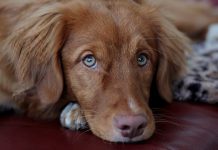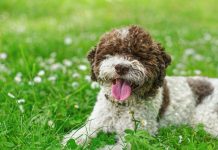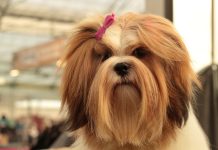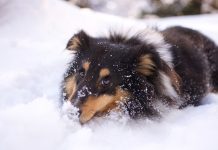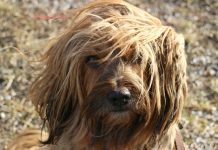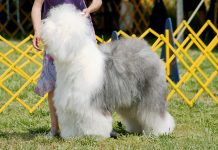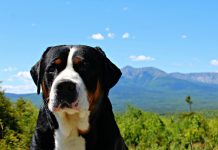History and Origins of the Goldendoodle Breed:

The Goldendoodle is a popular hybrid dog breed that originated in the United States in the 1990s. It is a cross between a Golden Retriever and a Poodle, specifically bred to combine the desirable traits of both parent breeds. The Goldendoodle was initially developed as a hypoallergenic service dog, suitable for individuals with allergies to dog dander.
The intentional breeding of Goldendoodles began in North America, where breeders aimed to create a dog with the friendly, intelligent nature of the Golden Retriever and the low-shedding, hypoallergenic coat of the Poodle. The breed quickly gained popularity due to its friendly disposition, intelligence, and versatility as a family pet, therapy dog, or service animal.
Physical Characteristics and Appearance of Goldendoodles:
Goldendoodles are known for their variety in size, color, and coat type, influenced by their parent breeds. Here are some typical physical characteristics and appearance traits of Goldendoodles:
- Size: Goldendoodles come in different sizes, ranging from standard (large), medium, and miniature (small). Standard Goldendoodles can weigh between 50 to 90 pounds and stand 20 to 24 inches tall at the shoulder, while miniature Goldendoodles weigh around 15 to 30 pounds and stand 14 to 17 inches tall.
- Coat Type: Goldendoodles can have different coat types, including wavy, curly, or straight. Their coat may inherit the Poodle’s hypoallergenic quality, making them suitable for individuals with allergies. The coat color can vary widely and may include shades of cream, gold, apricot, red, black, chocolate, or parti-color (two-toned).
- Facial Features: Goldendoodles typically have a broad head with a rounded skull and expressive eyes. Their ears can be floppy or slightly feathered, depending on the coat type.
- Body Structure: Goldendoodles have a sturdy and well-proportioned body, similar to the Golden Retriever parent breed. They have a deep chest, straight back, and well-muscled limbs.
- Tail: Goldendoodles usually have a long, feathered tail that hangs down when relaxed and may wag enthusiastically when excited.
- Expression: Goldendoodles are known for their friendly and intelligent expression, often characterized by a sweet and gentle demeanor.
- Overall Appearance: Goldendoodles combine the best features of both parent breeds, resulting in a dog that is athletic, graceful, and highly adaptable to various lifestyles and environments.
Goldendoodles are valued for their loving and sociable nature, intelligence, and compatibility with families of all ages. Their diverse coat colors and sizes make them appealing to many dog lovers seeking a loyal and affectionate companion. However, it’s important to note that individual Goldendoodles can vary in appearance and temperament based on genetics and upbringing. Regular grooming and exercise are essential for keeping Goldendoodles healthy and happy.
Goldendoodle Temperament and Personality Traits:
Goldendoodles are known for their friendly, affectionate, and intelligent nature, making them excellent family companions and therapy dogs. Here are some common temperament and personality traits of Goldendoodles:
- Friendly: Goldendoodles are typically outgoing and sociable dogs who enjoy being around people and other pets. They are known for their gentle and affectionate demeanor, making them excellent companions for families with children and other animals.
- Intelligent: Goldendoodles inherit the high intelligence of both parent breeds, the Golden Retriever and the Poodle. They are quick learners and respond well to positive reinforcement training methods.
- Playful: Goldendoodles have a playful and energetic personality, often enjoying interactive games, fetching, and outdoor activities. They have a youthful spirit that makes them great companions for active families.
- Affectionate: Goldendoodles are known for their loving and loyal nature. They form strong bonds with their families and thrive on attention and affection.
- Adaptable: Goldendoodles are highly adaptable dogs that can adjust well to different living environments, including apartments, suburban homes, or rural settings. They are versatile and can be both indoor and outdoor companions.
- Good with Children: Goldendoodles are generally patient and gentle with children, making them popular family pets. However, supervision is always recommended to ensure positive interactions.
- Social: Goldendoodles enjoy socializing with people and other dogs. Early socialization helps them develop into well-adjusted and confident adults.
- Alert: Goldendoodles make excellent watchdogs due to their alert and attentive nature. While they may not be guard dogs, they will alert their owners to unfamiliar sounds or visitors.
Training and Socialization Needs for Goldendoodles:
- Early Training: Start training your Goldendoodle puppy as soon as possible to establish good behavior and manners. Use positive reinforcement techniques such as treats, praise, and toys to motivate and reward them.
- Basic Obedience: Teach essential commands like sit, stay, come, and heel. Consistency and patience are key to successful training sessions.
- Socialization: Expose your Goldendoodle to different people, places, sights, sounds, and experiences from a young age. This helps prevent shyness or fearfulness later in life.
- Exercise Requirements: Goldendoodles are moderately active dogs that require regular exercise to stay healthy and happy. Daily walks, playtime, and interactive games are essential to prevent boredom and excess energy.
- Grooming: Depending on their coat type, Goldendoodles may require regular grooming to prevent matting and tangles. Brush their coat several times a week and schedule professional grooming as needed.
- Consistent Rules: Establish consistent rules and boundaries for your Goldendoodle to promote good behavior and prevent undesirable habits.
- Patience and Positive Reinforcement: Goldendoodles respond best to positive reinforcement and rewards-based training. Be patient, consistent, and encouraging during training sessions.
By providing proper training, socialization, and regular exercise, you can help your Goldendoodle develop into a well-behaved, confident, and happy companion. They thrive on positive interactions with their families and enjoy participating in various activities that stimulate their body and mind.
Health Considerations and Common Issues in Goldendoodles:
Goldendoodles are generally healthy dogs, but like all breeds, they are prone to certain health conditions. Responsible breeders aim to minimize genetic health issues by performing health screenings on parent dogs before breeding. Here are some common health considerations and issues in Goldendoodles:
- Hip Dysplasia: This is a genetic condition where the hip joint does not develop properly, leading to arthritis and mobility issues. Regular exercise and maintaining a healthy weight can help reduce the risk of hip dysplasia.
- Elbow Dysplasia: Similar to hip dysplasia, elbow dysplasia is a developmental disorder of the elbow joint that can cause pain and lameness.
- Progressive Retinal Atrophy (PRA): PRA is a genetic eye disorder that can lead to vision loss and blindness over time. Responsible breeders screen for PRA to reduce its occurrence.
- Ear Infections: Due to their floppy ears, Goldendoodles are prone to ear infections. Regular cleaning and inspection of the ears can help prevent infections.
- Allergies: Goldendoodles may inherit allergies from their parent breeds, especially skin allergies or food allergies. Consult with a veterinarian if your dog shows signs of allergies, such as itching, redness, or skin irritation.
- Hypothyroidism: This condition occurs when the thyroid gland does not produce enough hormones, leading to weight gain, lethargy, and skin problems.
- Heart Conditions: Some Goldendoodles may be prone to heart-related issues such as mitral valve disease or dilated cardiomyopathy.
- Gastric Dilatation-Volvulus (GDV) or Bloat: Large and deep-chested dogs like Standard Goldendoodles are at risk for GDV, a life-threatening condition where the stomach twists and traps air, leading to bloating and potential organ damage.
Living with a Goldendoodle: Suitable Environments and Lifestyle Considerations:
Goldendoodles make wonderful companions for families and individuals alike, but they thrive best in environments that accommodate their needs. Here are some considerations for living with a Goldendoodle:
- Space Requirements: Goldendoodles can adapt to various living environments, including apartments, suburban homes, or rural areas. However, they require adequate space to move around and regular exercise to stay healthy and happy.
- Exercise Needs: Goldendoodles are moderately active dogs that enjoy daily walks, playtime, and mental stimulation. Aim for at least 30-60 minutes of exercise per day to keep them physically and mentally stimulated.
- Grooming: Depending on their coat type, Goldendoodles may require regular grooming to prevent matting and tangles. Brush their coat several times a week and schedule professional grooming as needed.
- Socialization: Goldendoodles are social dogs that enjoy interacting with people and other animals. Early socialization helps them develop into well-rounded and confident adults.
- Training: Goldendoodles are intelligent and eager to please, making them easy to train with positive reinforcement techniques. Start training early to establish good behavior and manners.
- Companionship: Goldendoodles thrive on companionship and may experience separation anxiety if left alone for long periods. They do best in households where someone is available to spend time with them.
- Healthcare: Schedule regular veterinary check-ups, vaccinations, and preventive care to monitor your Goldendoodle’s health and well-being.
By providing a loving, active, and nurturing environment, you can ensure that your Goldendoodle lives a happy and healthy life. Regular veterinary care, proper nutrition, exercise, and socialization are key to maintaining their well-being and longevity.
Goldendoodle Variations and Breeding Practices

Goldendoodles, a popular hybrid breed resulting from the crossbreeding of Golden Retrievers and Poodles, exhibit a variety of variations based on factors such as size, coat type, and generation. Here are some common variations and breeding practices associated with Goldendoodles:
- Size Variations:
- Standard Goldendoodles: These are the largest size category and typically result from crossing a standard Poodle with a Golden Retriever. Standard Goldendoodles can weigh anywhere from 50 to 90 pounds and stand 20 to 24 inches tall at the shoulder.
- Miniature Goldendoodles: Miniature Goldendoodles are smaller and result from crossing a miniature Poodle with a Golden Retriever. They typically weigh between 15 to 30 pounds and stand 14 to 17 inches tall at the shoulder.
- Toy Goldendoodles: The smallest category, Toy Goldendoodles result from crossing a toy Poodle with a Golden Retriever. They typically weigh under 15 pounds and stand around 12 inches tall at the shoulder.
- Coat Variations:
- Curly Coat: Goldendoodles with a curly coat resemble their Poodle parent and are often low-shedding and hypoallergenic.
- Wavy Coat: Goldendoodles with a wavy coat exhibit a mixture of characteristics from both parent breeds, often with a moderate amount of shedding.
- Straight Coat: Less common but still possible, some Goldendoodles may inherit a straighter coat similar to that of a Golden Retriever.
- Generational Variations:
- F1 Generation: The F1 Goldendoodle is a first-generation crossbreed resulting from a purebred Golden Retriever and a purebred Poodle. These dogs exhibit a mix of characteristics from both parent breeds.
- F1b Generation: The F1b Goldendoodle is a backcross between an F1 Goldendoodle and a Poodle. This generation is often sought after for hypoallergenic qualities, as they are more likely to inherit a non-shedding, curly coat.
- Multigenerational (F2, F2b, etc.): Multigenerational Goldendoodles result from breeding Goldendoodles with other Goldendoodles or Poodles. These dogs may exhibit more consistent traits and are often bred for specific purposes, such as therapy work or service dog training.
- Breeding Practices:
- Health Testing: Responsible Goldendoodle breeders prioritize the health and well-being of their dogs by conducting health screenings for genetic disorders common in both parent breeds, such as hip dysplasia, elbow dysplasia, and progressive retinal atrophy.
- Temperament: Selective breeding aims to produce Goldendoodles with desirable temperament traits, including friendliness, intelligence, and trainability.
- Color and Appearance: Breeders may select for specific coat colors and patterns, such as cream, gold, apricot, red, chocolate, black, or parti-color, to meet the preferences of prospective owners.
- Ethical Practices: Reputable breeders adhere to ethical standards and prioritize the welfare of their dogs. They provide appropriate care, socialization, and early stimulation to puppies before they are placed in loving homes.
When choosing a Goldendoodle, it’s essential to work with a reputable breeder who conducts health testing, prioritizes ethical breeding practices, and matches puppies with suitable homes based on temperament and lifestyle. Additionally, adopting from a rescue or shelter is a commendable option for providing a loving home to a Goldendoodle in need.
50 Best Names with Meanings for Goldendoodles
Naming your Goldendoodle can be a fun and meaningful experience! Here are 50 unique and adorable names with meanings for your Goldendoodle:
- Sunny: Perfect for a cheerful and bright-natured Goldendoodle.
- Luna: Meaning “moon,” ideal for a Goldendoodle with a calm and serene personality.
- Max: Short for “Maximus,” meaning “greatest” in Latin.
- Bailey: Meaning “bailiff” or “steward,” a classic and friendly name.
- Rosie: Derived from “rose,” a sweet and feminine name.
- Finn: Meaning “fair” or “white,” great for a light-colored Goldendoodle.
- Willow: Inspired by the graceful and flexible willow tree.
- Buddy: A popular name for a loyal and affectionate companion.
- Zoe: Meaning “life,” a vibrant and lively name.
- Teddy: A cute and cuddly name, perfect for a fluffy Goldendoodle.
- Milo: Meaning “merciful,” a gentle and kind-hearted name.
- Ruby: A precious gemstone name for a beloved Goldendoodle.
- Winston: Inspired by historical figures and symbolizing strength.
- Daisy: A cheerful and playful name, like the flower.
- Oliver: A sophisticated and classic name for a refined Goldendoodle.
- Lola: Meaning “sorrows” or “lady of sorrows,” a charming and endearing name.
- Cooper: Referring to a barrel maker, symbolizing craftsmanship and reliability.
- Mocha: Inspired by the delicious coffee flavor, ideal for a brown-colored Goldendoodle.
- Poppy: Named after the vibrant and colorful flower.
- Gus: Short for “Augustus,” meaning “majestic” and “venerable.”
- Hazel: Inspired by the hazel tree and its beautiful nut.
- Charlie: A friendly and approachable name for a sociable Goldendoodle.
- Mia: Meaning “mine” or “beloved,” a sweet and endearing name.
- Cody: A strong and masculine name for a confident Goldendoodle.
- Penny: Symbolizing wealth and luck, perfect for a cherished companion.
- Archie: A spirited and lively name, full of personality.
- Lily: Inspired by the delicate and elegant flower.
- Toby: Meaning “God is good,” a cheerful and optimistic name.
- Sophie: A graceful and sophisticated name for an elegant Goldendoodle.
- Oscar: Symbolizing divine strength and champion-like qualities.
- Ella: Meaning “beautiful fairy,” ideal for a graceful and enchanting Goldendoodle.
- Rocky: A rugged and adventurous name for an active Goldendoodle.
- Scout: Inspired by the adventurous and curious spirit.
- Piper: A musical and melodious name, perfect for a joyful Goldendoodle.
- Zeus: Named after the powerful and mighty Greek god.
- Maggie: Meaning “pearl,” a precious and cherished name.
- Rusty: Ideal for a Goldendoodle with a beautiful reddish coat.
- Ivy: Inspired by the evergreen climbing plant, symbolizing resilience.
- Sammy: A friendly and approachable name, suitable for a sociable Goldendoodle.
- Winnie: Short for “Winifred,” meaning “blessed peacemaking.”
- Chloe: Meaning “blooming” or “fertility,” a graceful and charming name.
- Fergus: A strong and noble name for a courageous Goldendoodle.
- Annie: Derived from “grace” or “favor,” representing elegance and charm.
- Riley: Meaning “courageous” or “valiant,” ideal for a brave Goldendoodle.
- Harley: A spirited and lively name, symbolizing freedom and adventure.
- Bella: Meaning “beautiful,” a timeless and elegant name.
- Bruno: A strong and confident name for a bold Goldendoodle.
- Honey: Sweet and endearing, perfect for a Goldendoodle with a golden coat.
- Dexter: Meaning “right-handed” or “skillful,” a clever and resourceful name.
- Willow: Inspired by the graceful and flexible willow tree, symbolizing strength and resilience.
Choose a name that resonates with your Goldendoodle’s personality and characteristics, and enjoy the special bond you share with your beloved canine companion!

In conclusion, this comprehensive guide to Goldendoodle dogs has provided a detailed overview of this popular and wonderful breed. Throughout our exploration, we’ve delved into the history, distinctive characteristics, and essential care considerations that define Goldendoodles. Known for their friendly and gentle nature, intelligence, and hypoallergenic coat, Goldendoodles make fantastic companions for families and individuals alike. They are versatile dogs that excel in various roles, from family pets to therapy or service dogs. As you embark on your journey with a Goldendoodle, may you appreciate their loving personality and enjoy the deep bond that forms with this delightful breed, creating lasting happiness and companionship together.







